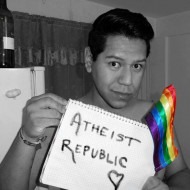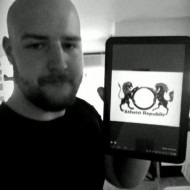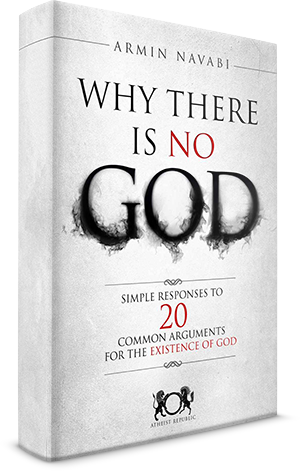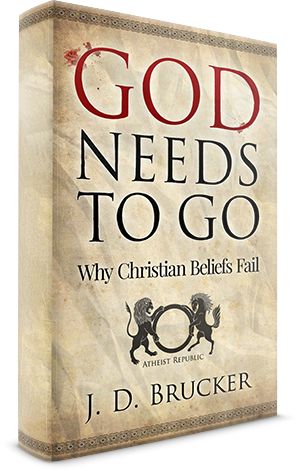Do you think it is possible that we'll ever have a definitive proof to God existence or non-existence?
Do you think that the atheist-non-atheist debate will ever have a winner?
Subscription Note:
Choosing to subscribe to this topic will automatically register you for email notifications for comments and updates on this thread.
Email notifications will be sent out daily by default unless specified otherwise on your account which you can edit by going to your userpage here and clicking on the subscriptions tab.




























No. I think not. To believe in God is a question of faith, without any proof...
The debate will never end because there will never be such proof. Simply because the forces that created the universe are beyond anything we are capable of grasping. There is no god as people believe in it. And like Mirta said, those that believe in god do it out of faith. The entire thing is based on believing in something you cannot have proof of.
You're saying "There is no God" with absolute certainty, but using your logic you can't prove that either.
He did not say "there is no god." He said there is no god as people believe it. No one can prove there is no god, what we can disprove are things like the bible, quran, torah, etc.
I would love some proof. It would certainly change things in this planet for sure. I always wonder why god would want us to have the slightest doubt that he exists. It would save millions of people a lot of pain and suffering if he gave proof. But why has he not appeared yet, well, most likely because he doesnt exist.
And like trevor said, "he" is just a force that is not even possible for us to understand.
Belief in a god will die down in the future, I believe. But not in our lifetime.
I completely agree. In a few hundred years people will look back and laugh at religion just like we now laugh at how people believed the earth was flat. It is only a matter of time.
I don't think it is impossible for their to be proof, however since there has being no proof yet then we most likely will never get definite proof.
I think that the burden of proof is a personal thing that we look for when we question our own faith or beliefs. Any proof you believe you have will never be totally accepted by others of any faith, religion or belief simply because of faith, as Mirta and Trevor have already mentioned. I have no reason to believe that belief systems will die out at all.
Firstly religion of some kind is as old as we are, it is an essential part of mankind and has made us collectively what we are today, and what we will be tomorrow. Secondly, although many people deny religion and faith throughout life, they still turn to religion and faith in times of need.
People all over the world still want their daughters to be married in church, their mothers to be buried or cremated by priests and they ask monks to bless them, their family and their ancestors. The day that all religion dies out is the day mankind ceases to exist and we cease asking questions.
Well said. Totally agree on this.
I'm sorry, and I don't mean to come off as rude at all, I respect people's beliefs. But you have a certain air of undeniable arrogance to your post, and I'm sure you don't mean it, but I feel I must call you out on a few points. I agree that one's proof will never be another's. However, you point out that religion of some kind is as old as we are, and yes it is. But so is fire, but it has lost many of it's original uses as a tool for humans - we know longer warm our huts with fires, we rarely cook over open fires, etc, I could go on. Religion has declined greatly in modern times, and while I agree it will never fully disappear, nor do I particularly wish it to, to say it makes us what we are is, again, I hate to be rude, but nonsense. Speak for yourself, of course, but religion has done nothing for me, nor has it done things for medicine nor physics in the same way that individuals who spoke out against the norm have done. So no, I don't think it's vital in that regard. Religion has both helped and hindered our progression, helping build community and (to an extent) morality, but it is no longer required for either of those things as people become more connected by the ever-increasing sense of human global community that we are beginning to experience.
To your second point, again, you argue from anecdote. I'm sure some people do as you say, but you seem to generalise. I have never once turned to religion. I've lost family members, loved ones, had to deal with cancer in the family and so forth, but I rationalise this world, I do not turn to god or gods. Many people get 'married' in a purely secular sense, or simply like the tradition and churches. That's not religion, that's tradition and enjoying past ideas. I don't know who you know, but any self-respecting and committed non-believer would find your remarks offensive, to group us all as, for lack of a better phrase 'No atheists in foxholes'. What a small view.
And your last remark claims religion causes us to ask questions, but on the contrary, I believe it's the opposite. I'm sure some religions do, but I think it's the individual and their upbringing. When I was at a Christian school as a child, as many UK people have been, the simple acceptance of the Biblical world-view and of things as facts in the face of science completely rebuts your point. In fact, many questioners become questioners because they experienced such hostility to their alternative views in religious organisations. I'm a philosophy and science student, and I ask questions because I am enamoured with the world, I have no pre-existing world-view so I have to look at things and analyse them and use those facts to create my world-view from such. To say that without religion we would cease to exist and not ask questions is, I'm sorry to say, a very narrow scope, and I hope you didn't mean it in such a way, but I fear you did, which is why I wrote this long reply. Again, apologies for any offence.
I think the problem with this is that most atheists wish to have empirical evidence. But that is not the evidence theists use. Most theists have been taught a world view from a young age, and then, in an act of cognitive dissonance, and to quell such, they then alter the facts to fit their theory. A 'confirmation bias' if you will. If you've been told God created the world with such beauty and design, it appears, on first glance, to be as such. Chameleons are so adapted to their situation, as are mosquitos and as are humans. So if you believe it was created, it's easy to say that's evidence of design. But if you instead take a neutral view, you see that, and thanks to our study of evolution, these things are akin to clay that is moulded by the potter, and the potter in this case is nature - the blind watchmaker. 99% of all life is extinct. We are those who survived because our adaptations make us so efficient at surviving these conditions. I believe too many theists, because they already possess a world view, are guilty of the confirmation bias (unknowingly, of course) and also guilty of special pleading - they often try to move the goalposts when logic begins to bear down upon their idea of God, as is often the case. Now, I speak only of some theists - there are many who spend their lives in agonising thought trying to figure out the world and where God fits in, and try so hard to avoid these things. But overall, these are not most theists, these are the questioners - which are sadly a minority in any human group, theist or atheist.
Beliving the Existence of God with Faith is the religion. His Supremacy has always made men want a proof for his existence but personally, I believe the quest for proof by men itself actually shows there is a God. Think of it. Re-think it.
Not really, because keeping an idea, a concept alive doesn't make the idea and the concept true or valid to exist in reality. Theists claim there is a god, skeptics ask why and how? But the only evidence it seems that the theist can provide is more claims and quoting from a book which does nothing to prove the existence of god which will lead to logical fallacies.
Who knows? Nothing is impossible. There are things that we have now that people many years before us didn't think would be possible to exist. But personally, even if there's no solid proof, I believe He exists.
I'd say no.
Even if we could prove that God does not exist, we can not prove that he never had existed. We've proven and proven wrong so many of the same things over recorded history that "proof" is pretty much an oxymoron.
I think it's good that we don't have proof. It keeps people from going too far. Think about it: if it was known for a fact that God existed, we would be getting our eyes gouged out for looking at the opposite sex, our children would be stoned to death by old people for being disobedient, and our daughters would be sold into slavery (at a fair price, of course). These are just a few examples.
Now, the other hand: If we knew for a fact that God did not exist...well...never mind. My point doesn't apply here. We still have laws to uphold morality and order. And even past our laws, we have morals. Maybe we would just have to worry about religious people going crazy and offing themselves and others...you know...like they do now.
It is interesting that the old testament actually does dictate what a fair price to sell your daughter at would be...
Of course current laws prohibit that. Thank god (lol) for the separation between church and state!
God is what is known as an unfalsifiable theory. This means that it can and will never be irrefutably proven true or false. Though, if you think about it, you can't use the Universe to disprove God because He transcends it; He is not dependent upon it to exist. Just like you can't use your newborn child to disprove your existence; you created it. You transcend your child. Likewise, the Universe will never be able to disprove God, it can only provide evidence that a God exists, firstly assuming one does. Similarly, your newborn child can't disprove you, as I stated above, because you created it! It can only provide evidence for your existence. This is why I choose to accept God. Because science has shown me that He is ever alive and always watching.
I'm interested to know exactly how science has shown you that he is alive and watching... because most scientists I know have looked at the evidence and come to exactly the opposite conclusion.
But I do like your newborn child analogy. I think it would be quite useful to explain to all those rabid soccer moms that their children can only provide evidence for, not supersede, their existence :)
I think that even if someone showed society a bundle of proof of that it would not change anything. People believe in a god they have no proof exists. So even if someone had proof they would still say that you just has to believe. So no the debate would will never end.
According to the Bible everyone will know that Jehovah God exists. After all, eventually the world is destroyed and the meek inherit the earth to live forever upon it. It says that no one would teach God anymore because everyone would know God.
Given human nature... even if god were to show himself, people would still be left wondering what lies beyond god, where god came from, are there other gods, etc. We're a very curious species, as most animals with idle time and the sensory organs necessary for explanation are.
I don't think there will ever be proof and even if there was, you would always have skeptics explaining it away.
I do not think that there will be a winner on such debate. There are some who never believe on things even there are proofs and there are also some who will believe even there are no proofs. :)
Agreed, but I don't think that there even *needs* to be a winner, provided we can all just focus on the actual problems of the world and get to solving them. When it comes to the world, I see god as largely irrelevant. Believe if you want to, but I don't think we as a species have the collective time to waste thinking about it.